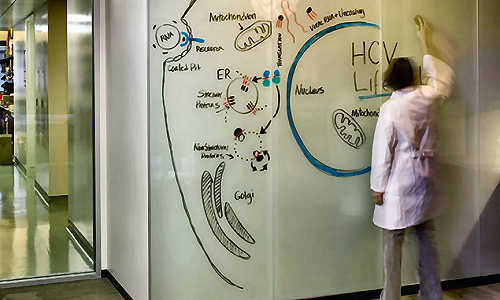The largest DNA-sequencing study of anorexia nervosa has linked the eating disorder to variants in a gene coding for an enzyme that regulates cholesterol metabolism. The finding suggests that anorexia could be caused in part by a disruption in the normal processing of cholesterol, which may disrupt mood and eating behavior.
“These findings point in a direction that probably no one would have considered taking before,” said Nicholas J. Schork, a professor at The Scripps Research Institute (TSRI). Schork was the senior investigator for the multicenter study, which was published recently online ahead of print in the journal Molecular Psychiatry.
Anorexia affects up to 1 percent of women, and has an estimated mortality rate of 10 or more percent, making it perhaps the deadliest of psychiatric illnesses. Anorexics severely restrict eating and become emaciated, yet see themselves as fat. Individuals with anorexia nervosa tend to be perfectionistic, anxious or depressed, and obsessive, said Walter Kaye, a co-author on the study, professor at the University of California (UC), San Diego School of Medicine and principal investigator of the Price Foundation Genetic Studies of Anorexia Nervosa.
How the disorder develops is still not fully understood. Anorexia predominantly affects girls and young women (the estimated gender ratio is nearly 10:1) and appears to be influenced in part by cultural factors, stress, puberty and social networks. Yet twin studies suggest that genetic factors have the largest influence.
The big mystery has been: what are those genetic factors? Gene-association studies of anorexics have so far produced few replicable findings. Researchers suspect that many genes can contribute to the disorder—and thus only large studies will have the statistical power to detect those individual genetic influences.
For this project—the largest-ever sequencing study of anorexia—Schork worked with an international team of collaborators representing more than two dozen research institutions. The many contributors included first author Ashley Scott-Van Zeeland from The Scripps Translational Science Institute and Scripps Health in La Jolla, California; Kaye and Pei-an Betty Shih from the UC San Diego; Andrew Bergen from SRI International in Menlo Park, California; Wade Berretini from the University of Pennsylvania; and Pierre Magistreti from Ecole Polytechnique Fédérale de Lausanne. The project made use of genetic information from more than 1,200 anorexia patients and nearly 2,000 non-anorexic control subjects.
For an initial “discovery” study in 334 subjects, the researchers catalogued the variants of a large set of genes that had already been linked to feeding behavior or had been flagged in previous anorexia studies. Of more than 150 candidate genes, only a handful showed statistical signs of a linkage with anorexia in this group of subjects.
One of the strongest signs came from the gene EPHX2, which codes for epoxide hydrolase 2—an enzyme known to regulate cholesterol metabolism. “When we saw that, we thought that we might be onto something, because nobody else had reported this gene as having a pronounced role in anorexia,” said Schork.
The team followed up with several replication studies, each using a different cohort of anorexia patients and controls, as well as different genetic analysis methods. The scientists continued to find evidence that certain variants of EPHX2 occur more frequently in people with anorexia.
To help make sense of these findings, they looked at existing data from a large-scale, long-term heart disease study and determined that a subset of the implicated EPHX2 variants have the effect of altering the normal relationship between weight gain and cholesterol levels.
“We thought that with further studies this EPHX2 finding might go away, or appear less compelling, but we just kept finding evidence to suggest that it plays a role in anorexia,” said Schork.
It isn’t yet clear how EPHX2 variants that cause an abnormal metabolism of cholesterol would help trigger or maintain anorexia. But Schork noted that people with anorexia often have remarkably high cholesterol levels in their blood, despite being severely malnourished. Moreover, there have been suggestions from other studies that weight loss, for example in people with depression, can lead to increases in cholesterol levels. At the same time, there is evidence that cholesterol, a basic building block of cells, particularly in the brain, has a positive association with mood. Conceivably, some anorexics for genetic reasons may feel an improved mood, via higher cholesterol, by not eating.
“The hypothesis would be that in some anorexics the normal metabolism of cholesterol is disrupted, which could influence their mood as well as their ability to survive despite severe caloric restriction,” said Schork.
For now that’s just a hypothesis, which Schork emphasized should be investigated further with more gene association studies and more studies of EPHX2 variants’ biological effects.
The study was funded principally by the Price Foundation of Switzerland. “It was a long and difficult study and the foundation was very gracious and patient, and that was important,” Schork said.
Other funding came from the National Institutes of Health (e.g., grant 5 UL1 RR025774). For more information, see http://www.nature.com/mp/journal/vaop/ncurrent/abs/mp201391a.html
Story Source:
The above story is based on materials provided by The Scripps Research Institute (TSRI).





